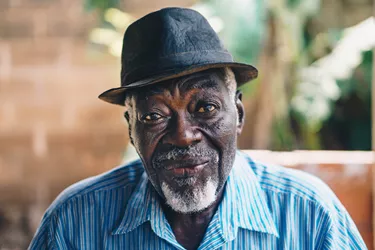My BPD and review of Ida's Diary
Karen reviews the new documentary, Ida's Diary, a personal diary of life with Borderline Personality Disorder, and shares how it resonates with her own experience of living with BPD.
I always find it hard to watch anything emotional (even if it's fictional!) so watching documentary footage of somebody battling a mental problem was never going to be an easy task. The fact that Ida has borderline personality disorder made it even harder, as I too have this same diagnosis. But this is the very reason I decided to watch Ida's Diary. I wanted to see how somebody else's experiences of the disorder compared to mine, and her video-diary presented a unique opportunity to do so. It was, as expected, a difficult watch - but for more varied reasons than I'd initially anticipated.
On the whole, I found Ida's symptoms to be very similar to mine: mood swings, intense emotions, feeling like you're never good enough at anything, risky/self-destructive behaviour, feeling criticised/judged by others etc. In fact there were several things I identified with which I had always assumed were just me and not symptoms of the disorder: hearing strange sounds (like muffled voices), taking things as 'a sign' from some higher power, seeing the devil's face in things (although whereas Ida sees it in her own reflection, I see it in other people's faces), and feeling like life is a 'test'... so they were real eye-openers.
The clever use of camera effects and music really helped portray the intensity of emotions people with BPD experience, from the excitable highs to 'what's the point in anything' lows, and the disorientation that goes with them. However, the film gave no indication of the length of time Ida was in any of these emotional states. There’s no set ‘rule’, but a defining characteristic of BPD is that these emotional states have a high frequency and relatively short duration. The editing however might give the impression that if Ida's upset in one scene and the next, she's continued to feel this way in between. In reality several months may have passed and she may have had periods where she felt reasonably okay. It's worth mentioning as it may mean that viewers with no experience or knowledge of BPD may end up with a skewed view of this aspect of it."
"Perhaps films like Ida's Diary will help to chip away at the stigma associated with BPD."
Ida’s diagnosis and recurrent hospitalisation is a very different experience to my own. It may be a cultural or individual thing, but I got the impression that Ida's BPD was viewed by the professionals as a much more serious condition than it has been for me. Ida was told she was psychotic, was diagnosed schizophrenic, given lots of medication, shock therapy and hospitalised many times. In contrast, all I've ever had is talking therapy and some long-winded medication trials - which make me feel like I'm expected be able to control my symptoms by myself, like they are a 'lifestyle choice' rather than an illness. I'm fairly certain that my social anxiety (which, interestingly, Ida also mentions she has) has been worsened by this. I imagine this is one of the reasons why BPD still has so much stigma surrounding it, whereas some other mental health problems are generally better understood and accepted in society.
"While the symptoms of BPD may never completely go away, being able to view your situation objectively rather than subjectively is a huge step forward."
BPD symptoms usually occur in reaction to a trigger, so it would have been useful to have more information about Ida's - particularly in relation to how interpersonal interactions affect her, as these, for me, are the biggest triggers. The fact she couldn't get the 'sweetie pie' comment out of her head was a clear cause for her shift in mood in that situation (which accurately illustrates how a seemingly innocent comment can be misconstrued and replayed over and over by someone with BPD), but I feel that the rest of the film gave the misleading impression that most of her symptoms appeared out of the blue. Moving house, getting the wrong date for her psychiatrist appointment and watching a film about a father/daughter relationship after having just talked about these issues in therapy all seemed to lead to a decline in Ida's mental state, but I'm not sure if viewers with no knowledge of BPD would pick up on the potential correlation between these events and Ida's symptoms.
I know what it is like to have gone through repeated ups and downs. You come out the other side a bit older and wiser, but you can also be more resigned to that fact that this is how it's always going to be. It's a kind of weary acceptance that solidifies each time you go through it. I saw that in Ida when she was walking along the snowy beach, trying to fight back the tears as she said, 'My eyes can see that it's pretty here. It just doesn't feel nice. I'm sure it'll be nice some other day. I just have to hang in there.' That was the moment that got to me the most. While the symptoms of BPD may never completely go away, being able to view your situation objectively rather than subjectively is a huge step forward - you have to somehow find the strength to keep going when everything else inside you is telling you to give up. I think this is also a realistic expectation, in terms of recovery.
"I am so grateful to Ida for having the foresight to record all of this footage, and for having the courage to share it."
When you've repeatedly experienced 'that heavy, indifferent feeling that tells you there's no difference between reality and TV,' it makes those times you don't feel like that so much more enjoyable, so I totally relate to Ida's appreciation of simple pleasures (her joy at baking cookies, or buying and boiling potatoes for the first time in her life). That's why, when she climbed to the top of the mountain, I could imagine how amazing it felt - she was literally on top of the world - and this made me feel genuinely proud of her. There was a risk that a happy ending could give the false impression that she was 'cured', but I feel the rollercoaster of thoughts, feelings and emotions typical of BPD were portrayed so well throughout the rest of the film that it was obvious Ida would still have recurring difficulties in the future, despite managing to climb this mountain - a hugely inspirational achievement, both physically and metaphorically! I felt like I'd been on her journey with her - which I suppose I had really, both in watching the footage of her during some of her most private times and by having gone through so many similar experiences myself. This shared journey made her final accomplishment all the more inspirational to me and I am so grateful to Ida for having the foresight to record all of this footage, and for having the courage to share it.
"...it’s given me hope and inspired me to keep fighting no matter how hard things seem."
So yes, Ida's Diary was difficult to watch, but not just because it shows the suffering of another human being. It was also because it reminded me of my darkest times and how close I've been to giving up. It made me uncomfortably aware of aspects of my life that I didn't even know were symptoms of BPD. It frustrated me how differently people with the same diagnosis can be treated. But it also reminded me that I’m not alone in feeling this way, and it’s given me hope and inspired me to keep fighting no matter how hard things seem. There will always be better times ahead, and Ida's Diary has reminded me that when those times come, I will feel them so intensely and beautifully that it'll make everything seem worthwhile.
I hope that viewers with BPD will take those same positives from the film, and that those who have no experience or knowledge of the condition will gain a greater understanding of how difficult and debilitating it can be.
Perhaps films like Ida's Diary will help to chip away at the stigma associated with BPD. I hope so.


Information and support
When you’re living with a mental health problem, or supporting someone who is, having access to the right information - about a condition, treatment options, or practical issues - is vital. Visit our information pages to find out more.
Share your story with others
Blogs and stories can show that people with mental health problems are cared about, understood and listened to. We can use it to challenge the status quo and change attitudes.















